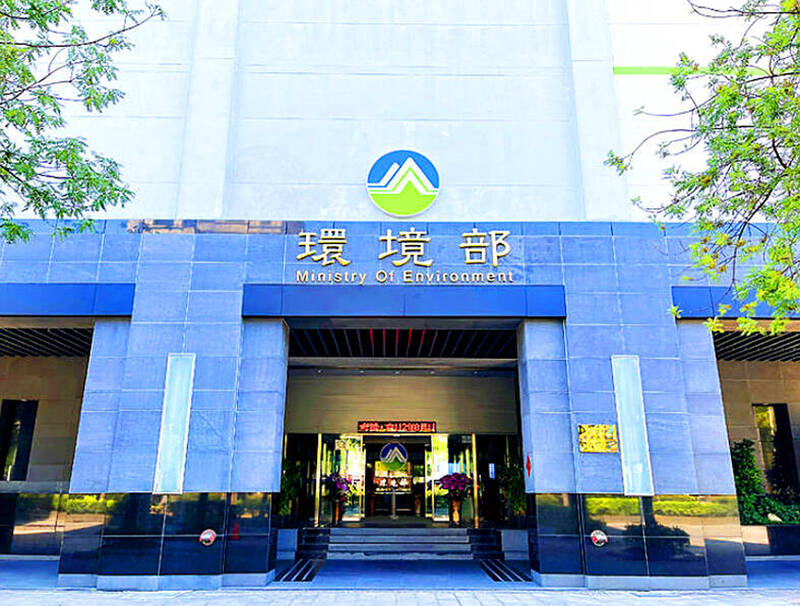The three laws proposed by the Ministry of Environment to promote carbon reduction through the use of carbon fees would only have a limited impact on reining in emissions if adopted, experts said.
Earlier this week, the ministry proposed three new laws based on the Climate Change Response Act (氣候變遷因應法): collecting carbon fees, managing a voluntary emissions reduction program and how carbon reduction goals should be set for companies subject to carbon fees.
Entities that emit more than the equivalent of 25,000 tonnes of carbon a year would have to pay fees starting from next year, with the threshold being lowered to 10,000 tonnes by 2030, the proposed bills stated.

Photo: Chen Chia-yi, Taipei Times
The carbon fee system would only have a limited substantive effect, because the government has also proposed to offer a preferential rate or a discount on carbon prices for target industries that take measures to reduce emissions, Liou Ming-lone (劉銘龍), an adjunct assistant professor in National Taiwan University’s Graduate Institute of Environmental Engineering wrote on Facebook.
Instead, Taiwan’s carbon fee should be finalized and announced immediately after the new Cabinet takes office on May 20, and the fee should not be set too low, he said.
The government has hinted that the rate might be NT$300 per tonne of carbon emissions, but environmental groups have proposed a minimum rate of NT$500 per tonne.
The real effects of the carbon fee collection mechanism on Taiwan’s carbon reduction efforts must also be re-examined by the government, Liou said.
Meanwhile, a joint statement by environmental groups said that the draft laws were “discounted sales” for companies subject to carbon fees.
The proposed laws would not only offer preferential carbon fee rates, but also provide additional discounts to carbon-intensive companies deemed as having “high carbon leakage risk” (those that could move offshore to avoid carbon fees), the statement said.
Additionally, the proposals do not follow the UN-backed Science Based Targets initiative standard, which is stricter than Taiwan’s goal of reducing emissions by 2030 by 23 to 25 percent, as the government had once promised, the environmental groups said.
On the other hand, Greenpeace Taiwan said that the motivation for enterprises to reduce carbon emissions depended on the carbon fee rate.
If the final carbon fee starting rate was less than NT$500, there would not be enough of a financial incentive for businesses to reduce carbon emissions, making the carbon pricing system ineffective, Greenpeace said.

An essay competition jointly organized by a local writing society and a publisher affiliated with the Chinese Communist Party (CCP) might have contravened the Act Governing Relations Between the People of the Taiwan Area and the Mainland Area (臺灣地區與大陸地區人民關係條例), the Mainland Affairs Council (MAC) said on Thursday. “In this case, the partner organization is clearly an agency under the CCP’s Fujian Provincial Committee,” MAC Deputy Minister and spokesperson Liang Wen-chieh (梁文傑) said at a news briefing in Taipei. “It also involves bringing Taiwanese students to China with all-expenses-paid arrangements to attend award ceremonies and camps,” Liang said. Those two “characteristics” are typically sufficient

A magnitude 5.9 earthquake that struck about 33km off the coast of Hualien City was the "main shock" in a series of quakes in the area, with aftershocks expected over the next three days, the Central Weather Administration (CWA) said yesterday. Prior to the magnitude 5.9 quake shaking most of Taiwan at 6:53pm yesterday, six other earthquakes stronger than a magnitude of 4, starting with a magnitude 5.5 quake at 6:09pm, occurred in the area. CWA Seismological Center Director Wu Chien-fu (吳健富) confirmed that the quakes were all part of the same series and that the magnitude 5.5 temblor was

The brilliant blue waters, thick foliage and bucolic atmosphere on this seemingly idyllic archipelago deep in the Pacific Ocean belie the key role it now plays in a titanic geopolitical struggle. Palau is again on the front line as China, and the US and its allies prepare their forces in an intensifying contest for control over the Asia-Pacific region. The democratic nation of just 17,000 people hosts US-controlled airstrips and soon-to-be-completed radar installations that the US military describes as “critical” to monitoring vast swathes of water and airspace. It is also a key piece of the second island chain, a string of

The Central Weather Administration has issued a heat alert for southeastern Taiwan, warning of temperatures as high as 36°C today, while alerting some coastal areas of strong winds later in the day. Kaohsiung’s Neimen District (內門) and Pingtung County’s Neipu Township (內埔) are under an orange heat alert, which warns of temperatures as high as 36°C for three consecutive days, the CWA said, citing southwest winds. The heat would also extend to Tainan’s Nansi (楠西) and Yujing (玉井) districts, as well as Pingtung’s Gaoshu (高樹), Yanpu (鹽埔) and Majia (瑪家) townships, it said, forecasting highs of up to 36°C in those areas